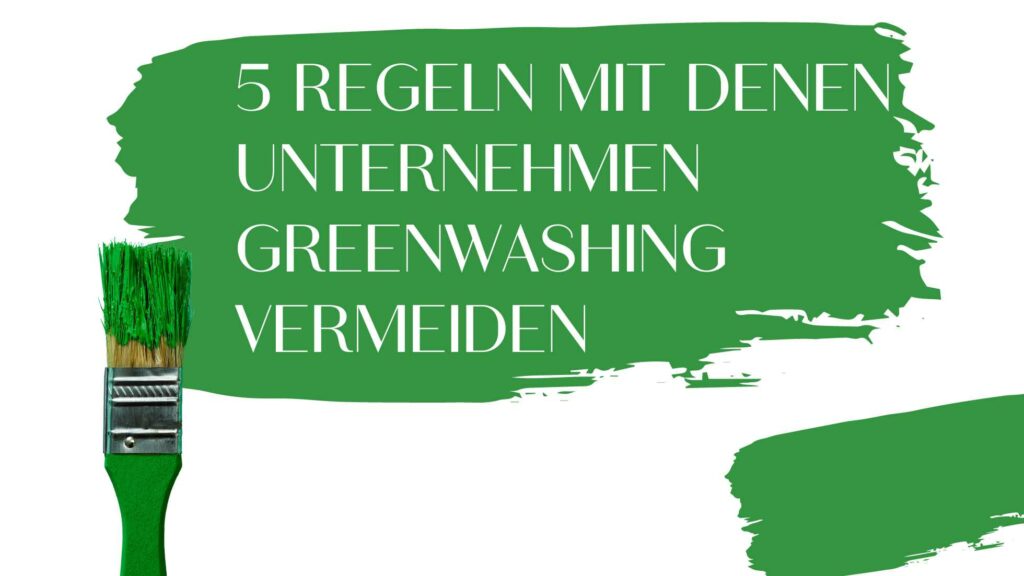Startseite » BIOvative Magazine » Echt Nachhaltig: 5 Regeln mit denen Unternehmen Greenwashing vermeiden
Echt Nachhaltig: 5 Regeln mit denen Unternehmen Greenwashing vermeiden
- 7. September 2023
- Autor: Philipp Dyllong
- Lesezeit: 9 Minuten
How does greenwashing happen?
Many companies are hesitant to address the issue of sustainable business practices for fear of inadvertently greenwashing. Still other companies have a vague interest in improvement and are unaware that they are greenwashing with untargeted measures. After all, this can happen unintentionally. Usually, it is due to one of three reasons through which companies greenwash:
- deliberate consumer deception
- the company thinks it is better than it actually is
- the company is not sufficiently familiar with the terms it uses.
If you want to know more about what greenwashing actually is and which companies have already excelled in the negative sense, you can find our article here on „Was ist Greenwashing“.
Deliberate greenwashing
When companies actively try to deceive consumers and the public, they join the illustrious ranks of companies with greenwashing scandals like Nestlé, IKEA, VW and Co. If that is the intention, then this text is not for you and you may stop reading here 😉
Greenwashing as a communication trap
While the first point is deliberate deception, the other two points are carelessness that causes companies to fall into the greenwashing trap. This often happens unconsciously, as many companies are too busy with their day-to-day business to deal in depth with the topic of sustainability strategy. Quite a few companies have good intentions, but by communicating them incorrectly, they run the risk of greenwashing anyway.

5 rules to avoid greenwashing
The transformation to a sustainable company is not easy. Many companies need to understand that individual measures, such as the social use of part of the profit, are not enough to call themselves sustainable. True sustainability only comes about when the company as a whole is aligned with this. We have linked you to a guide on how the transformation can take place here.
However, there are some universal rules that ensure that companies can avoid inadvertent greenwashing.
Honesty and transparency
Greenwashing, by definition, is a marketing strategy to deceive consumers. What is the opposite of deception? Honesty. By being open and transparent about your processes and efforts, companies can avoid being perceived as greenwashers.
The prime example of dishonesty is probably familiar to all: A few years ago, VW deliberately used software to manipulate the emissions levels of its vehicles. The ensuing scandal was huge and so was the fine the corporation had to pay.
To win the trust of customers, you should have nothing to hide. You can do that by allowing the public to see inside your company. Are you and your company on the path toward greater sustainability, but you haven’t reached your goal yet? Then tell your customers just that. No one is perfect from step 1.
Formulate sustainability goals
A sustainability strategy includes concrete goals that the company wants to achieve. These can relate to different areas, such as sourcing, conditions in the supply chain, CO² emissions, etc. For this, it is important to know one’s own strengths and weaknesses, i.e. not to consider oneself better than one is. To this end, companies can conduct a sustainability analysis and formulate their goals on this basis.
You should not do what DWS, a Deutsche Bank fund company, does. It has officially committed itself to the Paris climate goals (including capping warming at a maximum of 1.5°), but invests heavily in fossil fuels without doing so.
Companies must be aware of their impact and should communicate accordingly with humility. Potential customers should be able to sense the company’s desire to change for the better.
Concrete statements are better than vague ones
To make it clear to everyone what the company is trying to achieve, it is important to use concrete wording. Companies often get lost in eco-jargon and adopt terms that are neither trademarked nor well-defined. This makes it easy to misunderstand goals and intentions. Be careful with terms like sustainable or climate neutral (unless this point is certified proven) and rather tell what your company actually does.
Even if it is not intentional, overly vague statements result in unconscious misleading of customers and the public and thus constitute greenwashing. Companies should carefully check which terms are used and define them precisely in case of doubt.
Concrete goals and statements are extremely important in order to be able to measure one’s own sustainability goals against them. Companies cannot be measured by their intentions, but must deliver concrete results that can be verified by their customers.
Companies cannot be measured by their intentions, but must deliver concrete results that can be verified by their customers.
Ongoing improvement
Even if companies have a good sustainability record, there is always room for improvement. You can compare this with a professional athlete. The latter also trains regularly to become just that little bit better. Accordingly, the achievement of one or more sustainability goals should be taken as an incentive to achieve even more difficult or challenging goals.
For example, the company Einhorn, which sells condoms and menstrual products, has had a sustainability report and concrete goals for several years. Nonetheless, it is continuously striving for improvement here, and in 2021, for example, it stopped using condom packaging with aluminum. To this we say: Keep it up!
Get feedback
To prevent greenwashing, it is important to listen to your own customers, employees and shareholders and to be open to incentives and ideas from outside and inside the company.
Companies should also communicate this so that their own customers and employees can feel that their feedback is taken seriously.
The European Green Deal
Legislation in the area of environmental policy and consumer protection has been becoming increasingly strict for years. A tightening of applicable regulations can also be expected in the future, as can be seen in the example of the European Union’s Green Deal drafted in 2022.
Among other things, the package of measures provides for extensive measures against greenwashing: In the future, companies are to be prohibited from making misleading claims about the social and environmental aspects of their products and their shelf life. In addition, products on the European market are to become more durable and easier to repair.
If this package of measures is adopted as planned, a large proportion of conventionally operating companies will have to massively rethink and adapt their processes. Greenwashing as a PR method is now hardly possible, and companies should only be able to achieve a green image in an honest way.
Advantages of true sustainability
In addition to the good conscience that comes with an honest and sustainable company, there is a whole range of other benefits. Risks due to ever stricter legislation can be avoided, as can image damage caused by greenwashing scandals.
In addition, “green” companies are more attractive to many employees and benefit from more motivated employees.
The competitive advantage over non-sustainable alternatives naturally also offers the chance of higher sales and thus increased resilience on the market.

Philipp Dyllong

Philipp Dyllong
These articles may also interest you

DINplus organic waste bag certification – for a clean garbage can
Content DINplus organic waste certification Advantages of DINplus certification Requirements of the DINplus certificate The certificate DINplus in detail Compostability at DINplus Basis for certification

Ocean Plastic: Greenwashing oder Lösung gegen die Plastikflut?
Content We are suffocating in plastic waste What is “Ocean Plastic” and how does it contribute to solving the crisis? How can plastic be recycled?

Klimaschutzklage: Wie gut stehen Deine Chancen, erfolgreich eine lebenswerte Zukunft einzuklagen?
Content The most important facts about the climate protection lawsuit Your right to climate protection The legal basis for the climate protection lawsuit Liveable future


